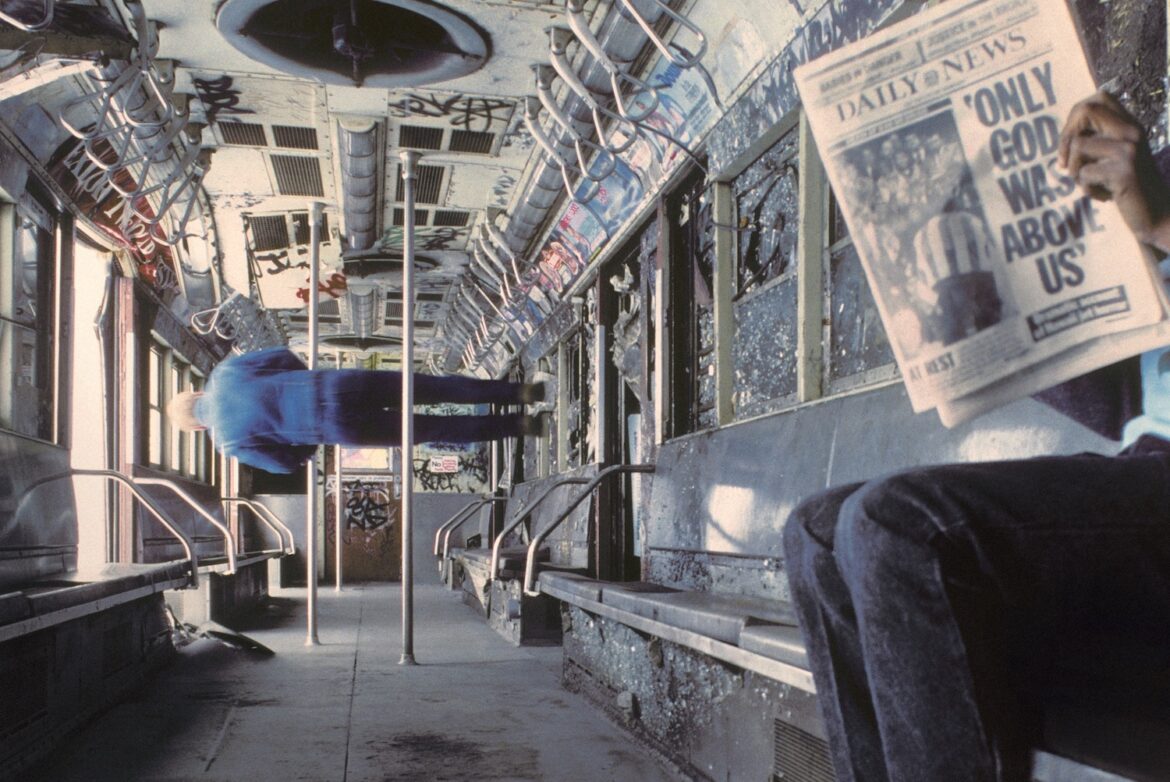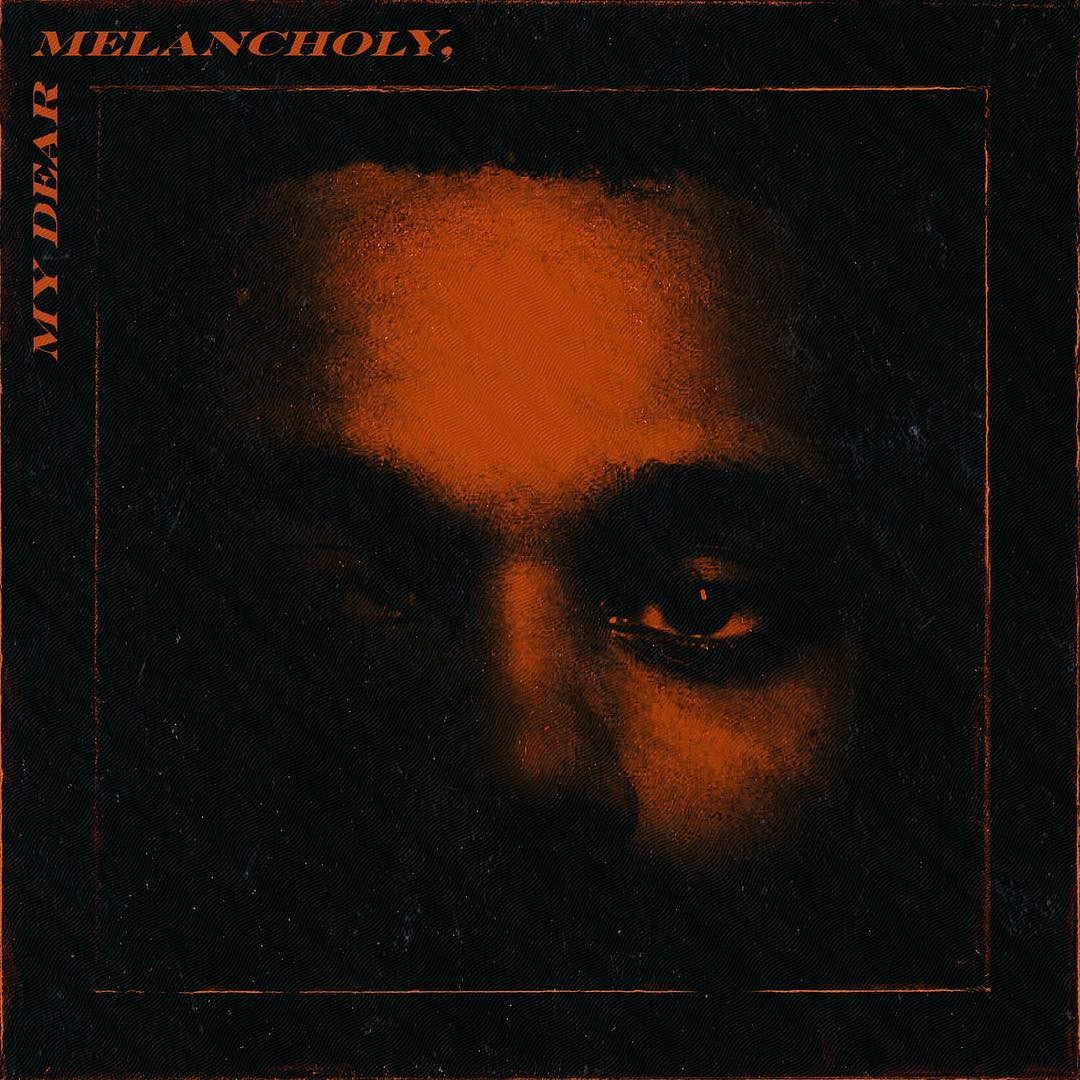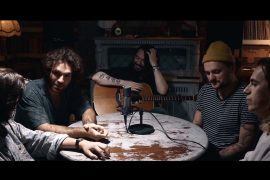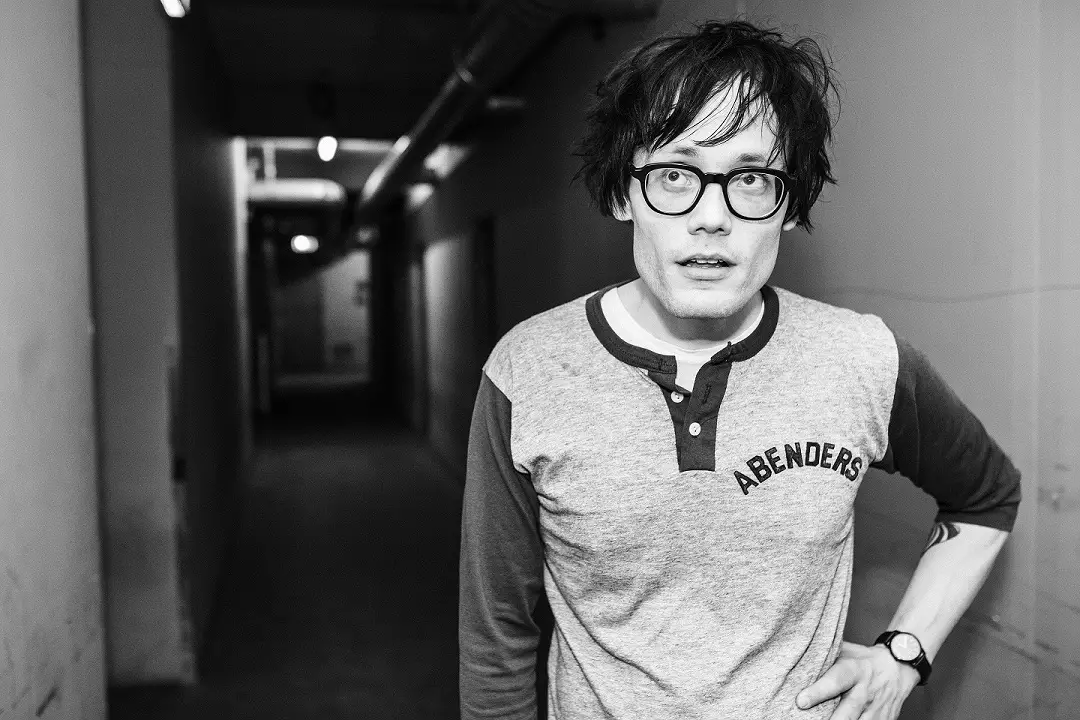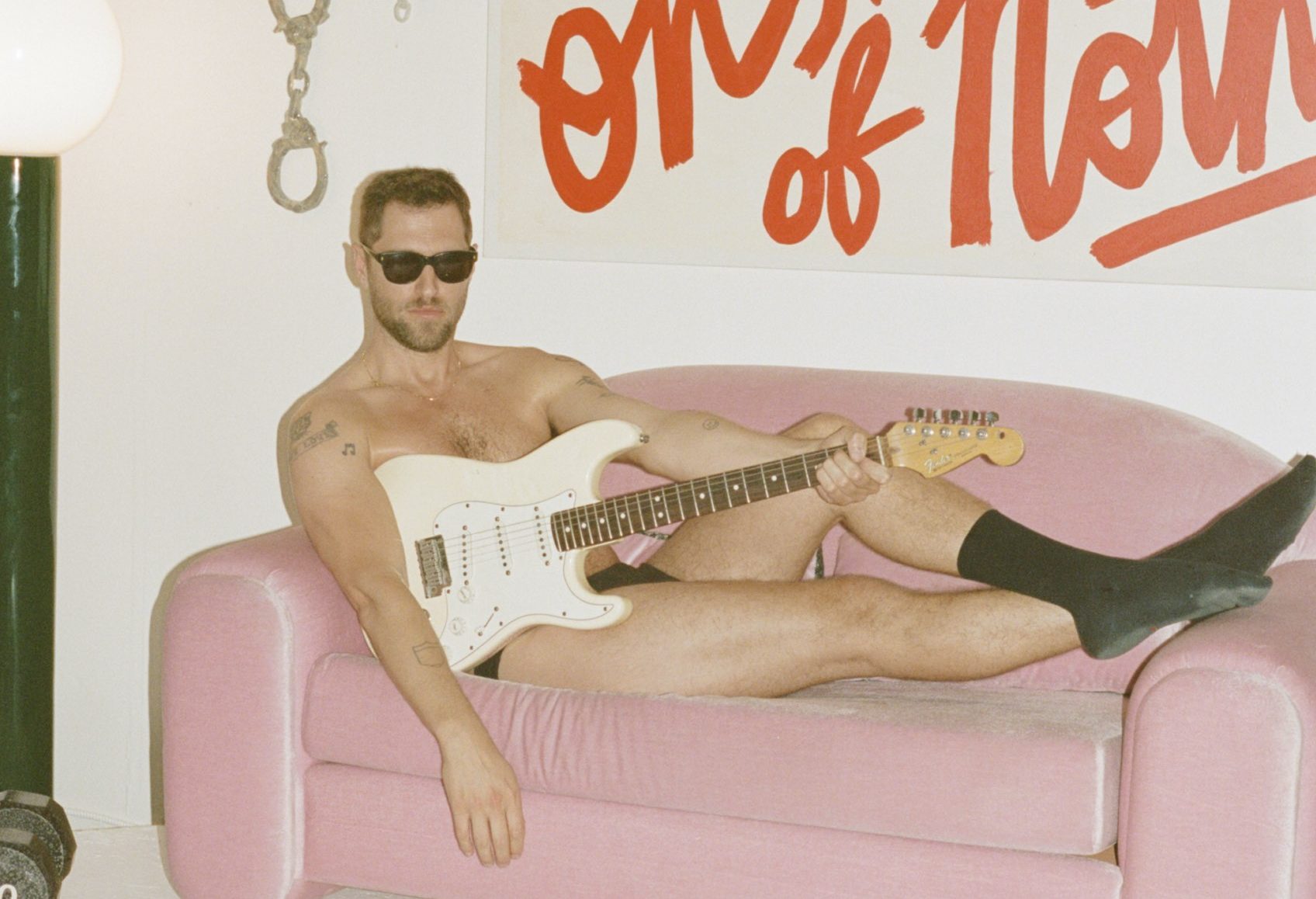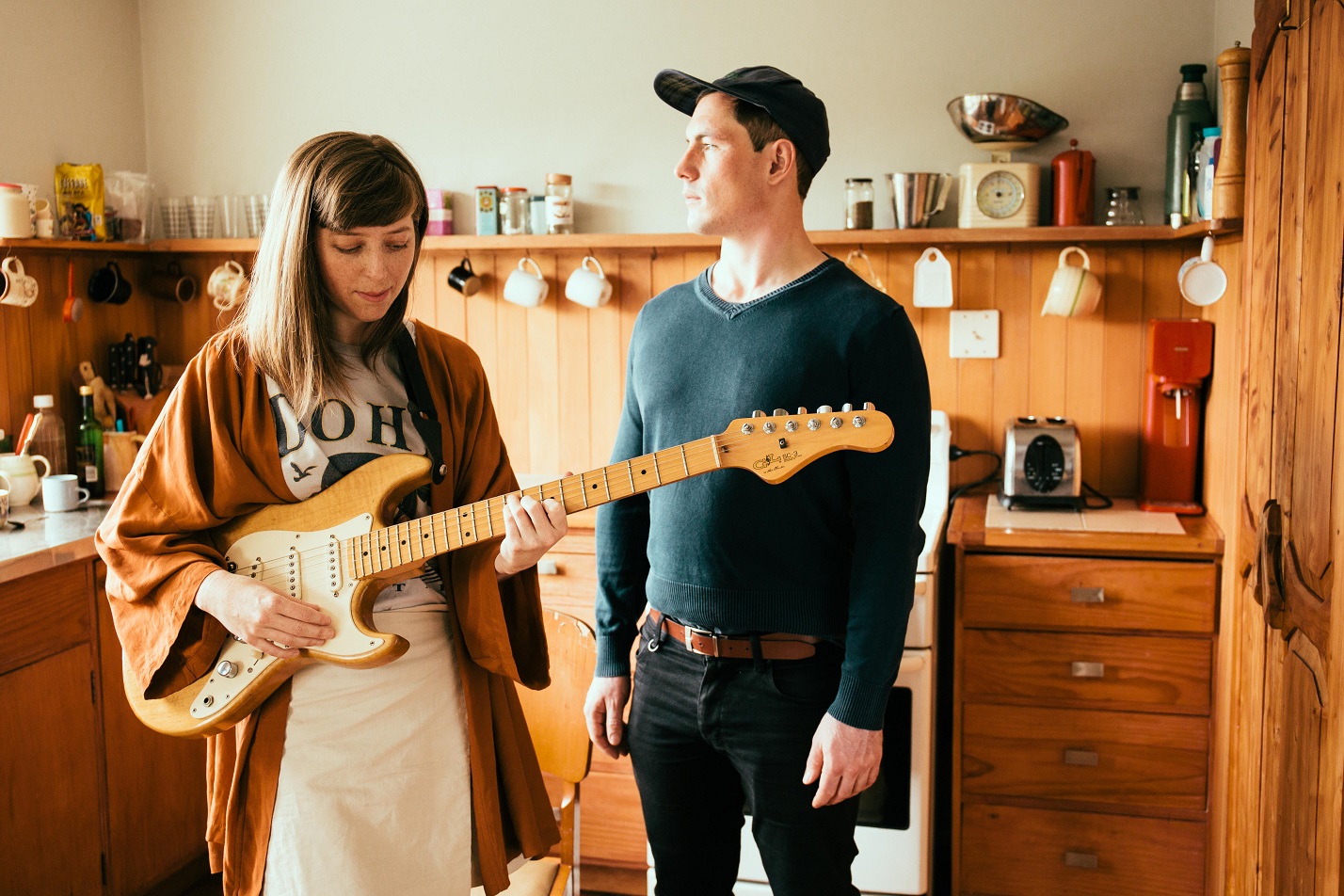Atwood Magazine’s writers discuss Vampire Weekend’s fifth studio album ‘Only God Was Above Us,’ unpacking its dense lyrical content, rich, unique production, and thematic callbacks to 20th-Century New York City.
Featured here are Atwood writers Dalia Alrayes, Dimitra Gurduiala, Hannah Burns, Josh Weiner, Kate Millar, & Kendall Graham!
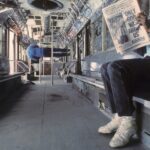
— —
To start, what is your relationship with Vampire Weekend’s music?
Dimitra: The spark with Vampire Weekend happened when I was barely a teenager, thanks to a casual listen to “White Sky.” Two seconds of falsetto, that’s all it took to convince me to listen to all of Contra and make me fall in love with the band. They kept me company through much of my teenage years, I don’t listen to them as often as I used to but they will always have a special place in my memories and heart.
Kendall: I was really only familiar with their debut album, 2008’s Vampire Weekend, and with the popular singles from 2010’s Contra (“Run,” “Cousins”), so I encountered Only God Was Above Us without a super precise picture of what Vampire Weekend is and does. I suppose I’m lacking some of their lore, so to speak. But I liked their indie-pop, alt-rock sound and that they sounded weird and off-kilter but interesting. The music and the production is what draws me in first when listening to an album, so VW’s sonic choices stood out in that way, first and foremost.
Kate: I was a little late to the party with Vampire Weekend – it was actually the song ‘Harmony Hall’ from the Father of the Bride album in 2019 that won me over to them! The ascending/descending acoustic riff was irresistible, I felt each pick run along my vertebrae. The literary edge of their lyricism really shone through, with such precise images (“Beneath these velvet gloves I hide the shameful crooked hands of a money lender”) and confessions; my inner existentialist still sings the line “I don’t want to live like this but I don’t wanna die.” Even the scuttling insects of the “Harmony Hall” music video couldn’t put me off.
Hannah: Like a lot of their following, it was A-Punk for me. I don’t remember hearing it until the summer going into highschool, probably 2014. I got obsessed with Oxford Comma and Diane Young at roughly the same time. Vampire Weekend really accentuated that coming of age feeling. They were the soundtrack to first kisses, skinny dipping, and convincing myself I liked the taste of Bud Light.
Josh: I’m a casual fan. I’ve listened to some of their albums– Father of the Bride and Modern Vampires of the City in particular– and have enjoyed them, so I was open to joining a roundtable here about their most recent one. Moreover, they seem to take long breaks between albums– this is their first album in five years, and their previous album came out six years before that– so it seemed worthwhile to lend my thoughts on their latest release while I still had the chance. I might not get another one for quite some time!
Dalia: I’ll never forget it – I was 14 finishing my first year of high school, 2014. Every day was a sunny day in Kuwait; on a warm mid-afternoon after lunch break, a friend (& rival school band flautist) puts me onto the “Diane Young” music video – from start to finish, it thrills me. I get home, look up Vampire Weekend on Tumblr, filter for audio and come across “Horchata”… “Here comes the feeling you thought you’d forgotten,” falling gently, immediately, into the marimbas dancing and whirling and the sweet details; focus uncovering subtle gems with every listen. I give Contra a listen, I thought I’d listened to anything like this, so expansive, packed and light, easy going, beautiful, limitless.
From swaying to “I Think Ur a Contra,” to the undeniable, jaunty “Giving Up The Gun,” “Taxi Cab” all summer long, the lady’s intent, direct, slightly unfocused, slightly wild stare on the cover. I was so excited about these little universes I’d stumbled upon. I move onwards to Modern Vampires of the City, whose impact on me I cannot overstate…another time. To embrace and discover through the pilgrimage of Hannah Hunt is actually what inspired me to start writing about music when I was about 19. Then with the moments of their self-titled (“Bryn,” I want to hang out with you, reach out,) all in all and so naturally, they right away formed a substantial part of the wide sky underscoring my formative years in a very personal way, it was just kinda my own. VW paints a canvas with each song; they neatly pack in a whole universe, of instruments, layers, lyrics, percussion, harmonies, at once thoughtful and unafraid… many a puzzle that only comes together with focus and time, and always a world of sonic layers to trip into.
My relationship to music has evolved and expanded very much over the last decade, as your whole galaxy does in that decade leading up to 25, but Vampire Weekend grew into a special place in my heart; those songs grew with me and I with them. Different lyrics, moments, sprinkled throughout such a formative decade. Existentially and instinctively, I approach them from a reminder that I’ve grown and continue to. Changing perspectives of time are packed into the VW experience inherently for me, it’s a special perspective.
2019’s Father of the Bride is, to this day, a contentious album amongst fans and critics alike. What are your feelings about that record, five years out?
Dimitra: I liked it, and I still do! I wouldn’t say it’s my favorite one, but it is certainly not to be condemned just because it differs from the “usual” Vampire Weekend. Tracks like “Sympathy,” “Unbearably White,” and “How Long?” are a pleasure to listen to, after five years we could all just stop pretending that it isn’t.
Kendall: I feel like there’s almost a reversal of the music and lyrics. Father of the Bride, even though occasionally there are heavier themes (heartbreak, betrayal, religion, etc.), the music is very bright and light. It doesn’t have the heaviness of their other albums, it’s happier, it’s sunny-California, laid back, and breezy (“This Life,” “Bambina,” “Sympathy,” the Steve Lacy collabs “Sunflower” and “Flower Moon”). I read that this album was partly inspired by jam bands and that kind of folksiness was easily discernible here. I really enjoyed the album. It seems like the most overtly “pop” album in their discography. The production is a lot simpler and “cleaner” than their other albums. I found I could focus more easily on the lyrics on Father of the Bride than on Only God Was Above Us, for example, because the latter has very intricate production that requires multiple listens to get the full picture. I can understand this album being contentious in the way that it’s different from standard VW fare. I’ve heard that it’s “too simple,” that it’s “unconvincing,” and that it doesn’t dive deep enough into its themes. But I like the juxtaposition of the sometimes downcast lyrics against the more uplifting music. Uncomplicated Vampire Weekend has its merits just like Frenetic Vampire Weekend does.
Hannah: I actually didn’t know this was a contentious album. Seems like an absurd take, with hits like Bambina, Harmony Hall, and Unbearably White. In 2019 I saw them headline Music Midtown in Atlanta, and ascended. The set was so joyful, the crowd dancing freely, and a huge sunflower casting a yellow glow over us that night. I can’t imagine not liking that record.
Kate: I feel the same way as Hannah! I was unattached to Vampire Weekend’s music, occasionally enjoying ‘Cape Cod Kwassa Kwassa’ and ‘Step’ but nothing farther than that. When Father of the Bride came out, I was finally wooed, won over by their creative beats and lyrics.
Josh: Hannah and I had the same reaction– Really? This was a contentious album? Why? Maybe some writers here who are more familiar with Vampire Weekend’s catalog top-to-bottom can provide more insight into this matter, but to me it seemed that Father of the Bride was well-received, and I do remember hearing some positive reactions to the album from my friends at the time. Anyways, I personally enjoyed that record myself and am pleased to see it be provided with a worthy follow-up in the form of Only God Was Above Us.
Dalia: It’s only contentious if your mind is not open! Father of the Bride is such a specific season of theirs; it’s very Earthy. I greatly appreciate it and I’m seconding all that Hannah said on this. It captures a sensation and experience simultaneously innate and external, one that’s timeless, beautiful and much more overlooked than it ought to be; the inextricable human and natural world. Interlinked forever, in love, life, being alive, synergy, and observation. It’s something that is so available and uncomplex and yet so ever expansive. We should be so lucky to be part of such a big, blue, beautiful living thing, and Father of the Bride to me finds itself in a reminder of this state, these roots we so often forget. The album is so refreshing in how effortlessly it lays in them, and doesn’t separate the tendencies of the human world from the natural one nor views it hierarchically; our community with nature as it should be. We often diminish that relationship in getting caught up in the whirlwind of our dense, convoluted human universes and neglect the other, this is our greatest downfall I believe. In a way, Contra has little moments as such too. It’s hard to explain besides “awareness.” The soft guitars, the choruses, the little bird chips + field recordings, the rivery flow—I loved the whole feeling it gave me back then as I do now, while my relationships to individual tracks find new places a little bit with time. We should all be a little more “Father of the Bride”y.
(In the spirit of honesty though – some tracks I just do not care for. Nothing against them, I just don’t personally resonate with that hyperAmerican country-esque vibe in contexts outside of the ‘1960s snappin country twang working class start a union’ context; that is indeed global and unfortunately timeless.)
I could go on forever but in the spirit of conversation, Jude Law’s softest reading of “Lord Ullin’s Daughter,” “Flower Moon” and “Big Blue,” I love you forever.
Also, if you play the Mario Kart level “Big Blue” (I believe at 150cc, not entirely sure though) to “Big Blue,” the timing aligns actually perfectly. It’s fantastic.
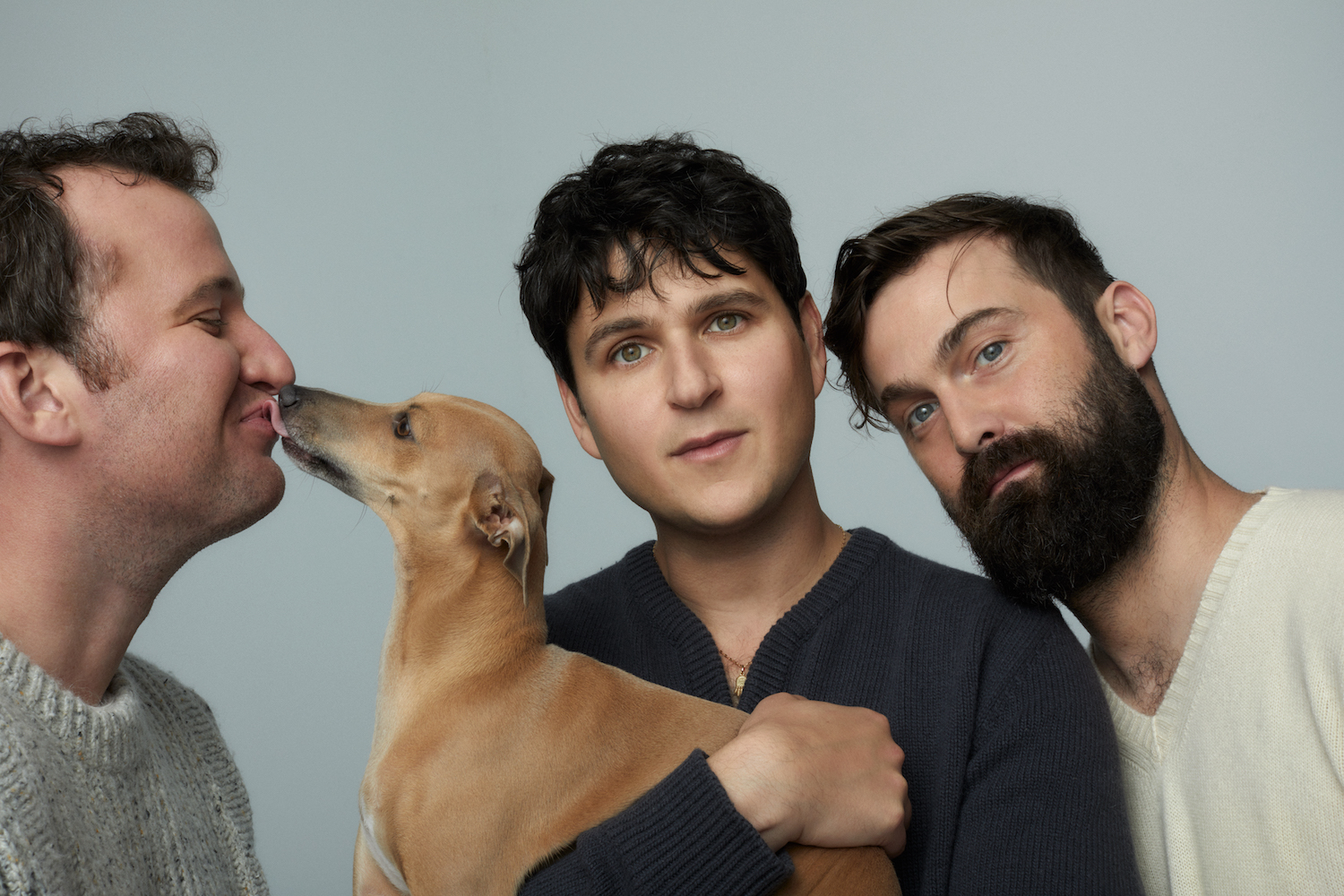
What were your initial impressions and reactions to Only God Was Above Us?

Dimitra: Boy, was it an experience! I was almost afraid of what to expect, but I knew from the first few seconds of “Ice Cream Piano” that I was about to listen to one of the albums of the year. It’s been a continuous whirlwind of emotions, by the end of “Hope” I was so moved that I honestly felt a sense of emptiness when I realized the album was over. Of course, I couldn’t stop listening to it for a while – and crying during “Hope,” too!
Kendall: I really liked how each song had the structure of a short film or story. The parts where songs break into a completely different rhythm or time signature and the instrumentation changes are really effective at turning this album into a show, giving it theater and conviction and cohesion. “Gen-X Cops,” “Ice Cream Piano” and “Mary Boone” are examples of this. I also felt like this being an homage to New York City came out very clearly with all of its callbacks to specific locations and typical character archetypes.
Kate: It was a bit of sensory overload at first – but I think that was because I was listening to it while riding the subway through Manhattan! A close to home, very accurate representation of New York City in all of its fuzzy distortion and overlaid sounds. I really heard the city in this album – the saxophone in “Classical” sounded like someone I would hear busking in Union Square Station. When I heard their characteristic hooky melody-making in “Capricorn,” I could settle into the rest of the album nicely.
Hannah: My impression was how perfect it was. I listened to it for the first time riding the subway on a rainy day. Then the next day when it was sunny. Then the next day when it rained through the sun. It’s my first Vampire Weekend album since moving to New York, and it feels like the unexpected moods of Spring. It’s perfect, I’m so grateful.
Josh: Assuming that initial reactions are supposed to be relatively brief, and later reactions are where you get to elaborate on your thoughts, I’ll just say this for now: “this album represents ten more strong tracks by a really good band! There’s lots of impressive singing and instrumentation all the way through. Keep it up, VW.”
Dalia: Though I had mixed feelings going in. I loved the direction of the singles, some moments were full, phenomenal, perfect, and some, I wanted just a little tiny bit more from them sonically upon first listen. When “Mary Boone” dropped and when I gave the lyrics some focus, the excitement built and was to be proven justified.
“Ice Cream Piano” started the album off so strongly, immediately I was thrilled on the journey I was beginning. I loved the drawn out guitar so much, on its own and then as it transforms as the tempo kicks up, the thrilling, whirling, soaring violins, each instrument pulls you by the hand into the thick of it, into the ritardando into the dissonant piano chord at the end. That seamless immediate transition to “Classical” put the song into a whole new light for me. (All in all, the album sequencing was perfect for the overall journey and that of each individual track. It was all so immersive.) There were moments that struck me with feelings whose intensity was so great, I felt grateful for the experience…the brilliance of these shining moments of mastery of so many instruments, choices, composition.
The first (second, third…) time around “Hope” felt like a punch in the gut. I don’t think I’ll ever forget my first listen to that song. The lyrics, its sustained build through tension and/with acceptance, the chord modulations towards the end, the orchestration…the end, in endings, in beginnings. Wow. The album all in all seriously exceeded my expectations, impressed and awed by its first impression, and was excited to get to delving into it more and more.
Which songs stand out for you on the album, and why?

Kendall: “Prep-School Gangsters,” “The Surfer,” “Mary Boone” and “Hope” are all stand-outs to me. I love that “Prep-School Gangsters” has these allusions to very specific details that make the story very individual, but the song as a whole is kind of allegorical to the idea of organized crime, kids and rebellion intersecting. “The Surfer” has a great jazzy, almost lo-fi hip-hop feel and Ezra Koenig sounds very melancholy here, which gives the song a cool moodiness to me. “Mary Boone” has a ‘90s/2000s pop, trip-hop-adjacent feel with twinkling pianos and even a choir; it has a lot going on but in a fun way. “Hope” has a folky, troubadour feeling that feels like a good album closer. There’s finality and a farewell feeling in it. The song also has a classic songwriting structure to it, and the extended break in the middle sounds really beautiful with great horns.
Dimitra: First of all, “Capricorn.” It starts out as a soft ballad and slowly presents these almost delightfully screeching sounds, a turning point from which there is no turning back. Easily the best track on the album for me, along with “Hope.” And that’s saying a lot, I usually listen to tracks longer than 5 minutes on a loop if and only if I like them like crazy. What’s more, I can’t think of a better conclusion to this album than “Hope.” It’s gentle but thunderous, a gentle caress that nonetheless leaves an absurd void.
Kate: “Prep-School Gangsters” was also a favorite of mine, echoing their classic breezy and mellow sound. “Capricorn” felt like a cool subversion of their old style, moving from the clean classical piano interludes, descending into such distorted electric guitar it almost sounded like an alarm. Loved the quippy line, “Too old for dying young / too young to live alone” – I heard their 40-year-old angst there, reckoning with aging and the passage of time, not dissimilar to Bombay Bicycle Club’s Everything Else Has Gone Wrong Album (“Losing them, losing collagen, losing elastin” – from “Good Day”). The line “sifting through centuries for moments of your own” also caught my ear – it felt like a summary of the album’s posture, exploring stories from figures of 20th-Century New York, including the famous gallery owner Mary Boone. It captured the band’s preoccupation with history, trying to parse out the meaning of their own lives through it.
Josh: I typically suck at answering this question, but I will say I really liked “Hope,” the tenth and final track. Something about it just feels like it closes the album out really well and leaves me hungry for more. Is another 5 or 6 years of waiting in store for me, though?
Dalia: They’ve been shifting around a bit since the album’s release, but (in no particular order,) “Mary Boone,” “Connect,” “Hope,” and “Ice Cream Piano.” Ultimately though, “Connect” is surely one of my favorite songs this year. Every listen plunges me deeper headfirst into that song. From start to finish, the synth hopping on subdivisions, the dialogue between the low assured bass and the spiraling pianos, which subside to the bass’s dialogue with soft vocals between the all encompassing piano’s passages. The way the bass flows in undertow, takes centerstage, hops, the bongos sliding in, the sister string voices…I love when in orchestration, each instrument carries its own journey – a quality I always appreciate so heavily. On “Connect,” this includes the production as well..the reverb and dips before the last instrumental break; this track is a community, so many pulses beating together.
As on “Connect,” there are a lot of moments and layers that stand out to me on the album, more than simply songs in their entirety; the shoegazey guitar sounds, the soaring violins on “Ice Cream Piano,” the saxophone break on “Classical,” the sweetly, firmly, flowing riff and its accompanying repeated note on “Pravda,” the sparse drums of “Capricorn” (the drums all throughout the album are just phenomenal), the utilization of bass and space in “The Surfer,” to little moments where band members speaking pop into the production – the last chord on the upbeat of “Capricorn”, guitar dialogues like in “Pravda” after its build and release, soft Ezra-instrumental duet at the end of “Prep-School Gangsters,” that beautifully twinkly bridge of “Mary Boone,” the tendency to go baroque just whenever, classic(al, hah) Vampire Weekend. Lyrically as well, this album struck me so strongly. More on this in a moment…
Do you have any favorite lyrics so far?
Kendall: Some lyrics that stand out, from “The Surfer,” are in the chorus: “But you were born beneath fluorescent lights / You’ve never seen a starry night, you saint.” I grew up on an island, so I’ve had kind of the opposite situation, at least thematically, and it makes me both imagine what it would have been like to grow up in a city and have this constant stimuli and noise a completely different pace of life, and also appreciate this pace of life I’ve been born into. How one’s environment informs their values or expectations is an interesting thing to me. And also in “Hope”: “The embassy’s abandoned now / The flag that flew is on the ground / The painting burned, the statue drowned / I hope you let it go.” It’s really powerful imagery, first of all, but you hear detachment in there, too, and it reinforces the album’s themes of war and conflict and the fallout from that. What’s done is done, so it’s time to move on.
Dimitra: “Who builds the future? / Do they care why? / I know you’re tired of tryin’ / Listen clearly, you don’t have to try” (from “Capricorn”). On my first listen I thought these were some pretty pessimistic lyrics. However, the more I listened to the song, the more I realized I was completely wrong: We are not almighty, and most importantly we cannot prevent all the evil in the world, even if we try and try again. Sometimes we simply have to detach ourselves and let things happen. Let ourselves be carried along by the currents for a while, however stormy it may be, until we reach the shore.
Hannah: In “Pravda”: “The final moments in the doorway (the final moments in the doorway) / The sacred light of afternoon (the sacred light of afternoon).” That image is so heartbreaking, paired with something so delicate. It feels like a reminder of how fleeting beautiful things can be, and a reminder of the beauty itself. That’s why I love Vampire Weekend. They have lines that will always linger.
Kate: I’m a sucker for self-referential lyrics, lines that sound like they’re about music-making itself. Even though “Ice Cream Piano” is a fictional story from a fictional persona, I hear Ezra’s own confession shine through: “In dreams I scream, ‘Piano’ / I softly reach the high note.” The way for his subconscious to express itself is not in words but in the notes of a piano.
Josh: I happen to have the song “Capricorn” on as I answer this question, so I’ll just say that I do approve of this song’s chorus: “Capricorn: The year that you were born finished fast and the next one wasn’t yours.” I guess I just like the Carpe Diem-type message that’s embedded therein.
Dalia: I think this album was so so strong lyrically, many lines just stuck with me – so I’m going to list out a handful, many in agreement with my friends here:
“In times of war, the educated class knew what to do. In times of truth, their pupils could never meet your baby blues.” “Four hundred million animals competing for the zoo. It’s such a bleak sunrise.”
“The memories don’t fade, surprising fate for days”
“But you were born beneath fluorescent lights, you’ve never seen a starry night, you saint” (is very personal to me; I’m from the Lebanese mountains and was raised in Kuwait City. It strikes a chord through time for me in a few ways.)
Truly all of “Hope” is worth a devoted read, but upon first listen, “the prophet said we’d disappear. The prophet’s gone, but we’re still here” really struck me. I’ve been sitting with “Hope” since the album’s release; its lyrics have been shifting for me in terms of what I’m getting out of them, so I’ll leave this at that for now.
“The world looked different when God was on your side” (To me, God – although my ideas on what this means shifts – is a force that’s omnipresent, a presence that permeates and pulses through everything around us.)
“Capricorn, the year that you were born finished fast and the next one wasn’t yours”
“Sifting through centuries for moments of your own”
I’ve got such a soft spot for Ezra’s lyrics. They feel so effortless, and unravel in moments, or with time.
Only God Was Above Us is said to draw artistic inspiration from 20th-Century New York City. (Where) do you hear the city in these songs?

Kendall: I hear it in “Prep-School Gangsters,” in its “summer turning to fall,” and in the guitar melody, but to me it’s most overtly illustrated in “Mary Boone.” It’s a direct reference to a prominent NYC gallery director and art dealer, who was later convicted of tax fraud, and has Brooklyn and Queens name-dropping, references to the theater and the train, etc. But it almost seems like a farewell, or a lament to that time, it’s very forlorn, and that choir feels like it’s sending someone, or something, off. I also hear it in the generally theatrical nature of the music, particularly in the pianos and orchestra instruments (“Ice Cream Piano,” “Capricorn,” “Connect”). I associate the piano here with both a Broadway kind of style, and with a piano bar style, too, which has always felt very “New York City” to me.
Josh: I mean, the band is from New York City and evidently-name drop a few sites around town (Grant’s Tomb, Penn Station, etc.), but if this record does indeed draw inspiration from 20th century NYC specifically, it might take me a few more listens to identify where/how. I know some tracks allude to lead singer Erza Koenig’s college experiences at Columbia University – but that was in the early 21st Century, it seems. Also, Grant’s Tomb was constructed in the late 19th century, for the record.
Dalia: Well I feel as though I have little to no authority on this as, again, a 1999-born and raised Arab, my reference is to the aesthetic and my interactions with the culture of it, as a single observer of a time passed. Aesthetically, I think, the album is defined in and propelled by periods in which it soars, is open, totally assured and unafraid to move regardless, embraces transform, casually cool, effortless and theatrical, gets funky, cultures connecting; it’s got a lot of that personality to it, most especially in “Mary Boone” – embracer of flow and connectivity. The album is theatrical and assured in nature, and, agreeing with Kendall, feels to be lamenting very often. It feels as though a reflection, taking place in questions while that time winded down into who knew what, rather than an attempt to emulate it.
Though the record draws on 20th Century New York City, how does it speak to life in 2024?

Kate: I feel this album really reckoned with the sense of injustice and corruption in the world – especially “Classical,” “Gen-X Cops,” and “Hope.” The high whines at the start of “Classical,” after the guitar strums, sounded almost like a sample from Public Enemy or some other west coast hip-hop, which immediately set up a feeling of protest. Then the lyrics brought it to fruition – an overt criticism of “how the cruel, with time, becomes classical.” It seems, implicitly, they are criticizing American notions of what is “classical” (a very white, patriarchal and Eurocentric concept), prophesying the crumbling of its foundations. “I know that walls fall, shacks shake” feels like a modern version of Thomas Wyatt’s prophecy of the fall of the British Empire, circa regna tonat (thunder rolls around the throne).
Kendall: Where I feel like I hear the wider world in this album is in songs like “Gen-X Cops,” “Ice Cream Piano,” “Hope,” and “Connect.” “Gen-X Cops” deals with millennial-age strife and contrasts it with the dilemmas of the previous titular generation. “Each generation makes its own apology” is a lyric that really stands out. What will we as millennials or as Generation Z have to apologize for? “Ice-Cream Piano” has interesting commentary on irreconcilable issues that are applicable on both a micro and a macro scale, reflecting everything from the way navigating interpersonal relationships has changed how we relate to each other as human beings, to large-scale civil and military conflicts, occupations, genocides and wars. “Hope” has these same military associations that are much more blatant; the U.S. Army is mentioned directly in the first verse. “Hope” brings to mind protest songs from the 60s and 70s, too, even down to its classic, simple verse-chorus structure. It’s an ironic ode to acknowledging the inevitable antagonistic and negative forces in life. In “Connect,” I hear a desire to get back to a lifestyle that’s more grounded and less dependent on substances. It sounds like the world is hazy and blunted and Koenig feels detached from everything; this prohibits him from making genuine bonds and having authentic experiences. It seems like a widely-relatable sensation in this day and age. I’ve particularly noticed many people lately approaching and engaging with sobriety from a number of perspectives.
Dalia: Oh god; sometimes I wonder how much is drawn out of specific references as it so perfectly captures these pervading pockets of the universe (or perhaps the universe I inhabit) today.
Comments on class and its role are pondered all throughout the album (see: “Prep School Gangsters”) Agreeing with Kendall though, these foundational ideas are not necessarily unique to the wreck of world’s history. This awareness is not new even to Vampire Weekend – exacerbated on this album in today’s universe-on-fire, but not unseen before by any means. To me, in a way, Only God Was Above Us is an emotional development and extension of ideas from Modern Vampires of the City. (I’ve been thinking of “Hudson” quite a bit lately.) The album delves deeper in its exploration of conflict, internal and external, separate, as one; on degrees of the individual and the communal, a waterfall highlighting the conjoining of worldly existentialism and inner conflict; all as their own (universes of) entities, and as inseparable from one another, at every perceivable layer. “Dodged the draft, but can’t dodge the war. Forever cursed to live insecure…”
The closing track opening with “the bull has gorged the matador” and ending with “I hope you let it go” brings it all together, with all its movement flowing within. Even the fact that every listen uncovers a new emotion in the battle of acceptance and tension, it speaks volumes to our internal battle and the relationship to and between the outside/inside world. It’s not as much of a fight rather than an attempt on balance between the cynical and optimistic, fight and release, war’s existential nature individually and collectively.
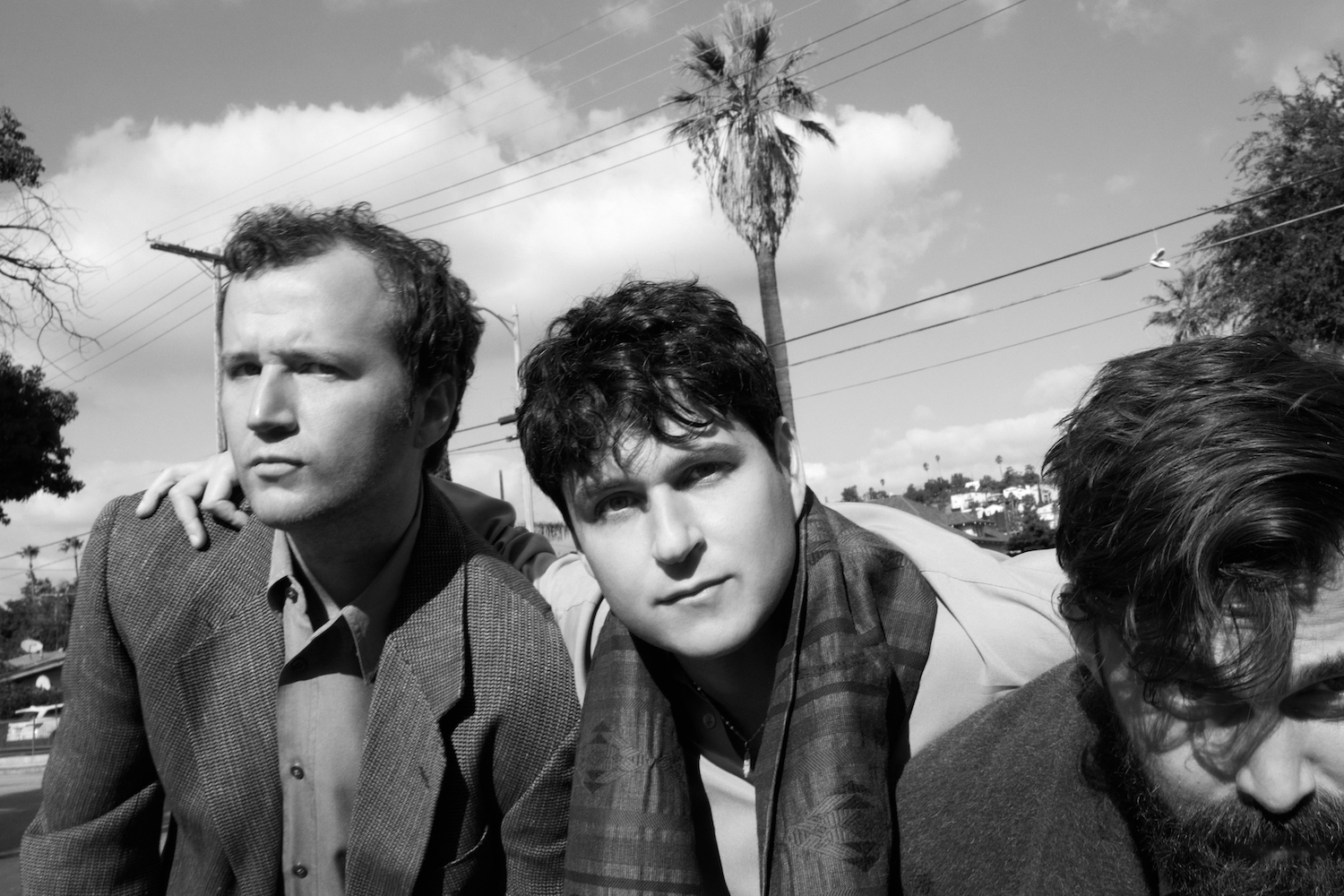
How do you feel about the continuation, here, of the band’s signature sounds and eclectic production? Does it feel recycled and stale, or definitively “Vampire Weekend”?

Kendall: I think because the experience that I’ve had with Vampire Weekend has so far been pretty marginal, and I didn’t really do a deep dive of their music until after I listened to Only God Was Above Us, I may have a different perspective from someone who is more of a fan or has a longer history with them than I do. Their eclectic musical choices have worked in their favor because I really can’t think of any other acts that I would compare Vampire Weekend to; they’ve done an incredible job of being very singular and unique. So in this regard, they are definitely “Vampire Weekend,” although for me, having gone back to listen to their other albums (Father of the Bride and Modern Vampires of the City) and having the foundation of their self-titled, it grew a little repetitive for me. Whether that time needed to be spent incrementally getting acclimated to their sound instead of all at once, who can say.
Hannah: I’d much prefer to think of their sound as cohesive and “definitively Vampire Weekend.” They do that signature sound well, and still make it unique and inventive five albums in. I wouldn’t want them to start moving in a different direction in terms of sound and production, but I’d follow them either way.
Kate: To me, this album felt like a translation of the band’s signature sound into the grungier aesthetics of the ’90s. Their earlier albums had a much sunnier sound – this time around, I feel the street grime of New York City and existential angst. As usual, their songs traverse centuries of music genres – in “Mary Boone” alone, they combine hip-hop samples with choral singing!
Josh: Nothing felt recycled or stale to me! This is a very lively and energetic record, as far as I can tell.
Dalia: I second everything everyone’s saying! I don’t think it feels recycled at all, I think it’s more of a development, maturing of their unique identity..it is natural, impressive, and inventive to the extent where I feel a little bit like a proud mother. If anything, at times I found I wished they had gone just a step further, added an extra ingredient. I found it to be incredibly expansive and free, yes, though there’s a bit of rigidity to it yet to be let go of, but maybe that’s just in my personal taste. Definitely not overdone or stale, I hope to see them move forward wherever their paths take them, and hope to see them take more risks in the future, take themselves a little less seriously (in ways they’ve definitely done before,) just totally let go. Vampire Weekend, release a song in an odd, or even compound, time signature, please. Just one!
Which new song(s) are you most excited or curious to hear live?

Kendall: I’d be really curious to hear “Mary Boone” and “Gen-X Cops,” the latter because of that really nice guitar riff throughout. It really caught my attention and I keep going back to that song because of it. It’s got great energy. “Mary Boone” would be cool to hear live because, much like that riff, the choir keeps me coming back to the song, and it feels like the most self-contained “story” on the album. Plus I bet with the drums and strings it would sound perfect at a summer festival, at sunset, with a nice breeze. Also “The Surfer,” and for the same reasons as “Mary Boone,” because it invites communal listening in a beautiful environment. That whole first minute is probably my favorite 60 seconds on the whole album.
Dimitra: “Classical,” definitely! An absolute earworm, I would love to hear this chaotic (in the best possible sense) union of saxophone and guitar riffs, I’m really curious about how it sounds live. I may update you in a little over a month, as I will see the band at Primavera Sound in Barcelona!
Josh: I second Dimitra – “Classical” sounds like it could be subject to a really strong live rendition. I’m a sucker for live jazz, and so I’m sure I’d fall hard for the saxophone belting that’s laced into this track. Plus, the fast piano-playing on “Connect” would probably be really cool to see brought to life onstage. I cannot also claim to have tickets to see Vampire Weekend perform soon in Barcelona myself, but we’ll see how my fortunes fare….
Dalia: “Connect”! I just can’t wait to feel these piano movements spring to life all around me. I really appreciate the jam territory they’ve been leaning into since around Father of the Bride and I so greatly look forward to their development of that. “Jerusalem, New York, Berlin” and “Sunflower” live at the Hollywood Bowl are among my fondest musical memories.
I’m with the rest on “Classical,” let that saxophone soar! All in all, I cannot wait to watch all these symphonies fly, connect, and come together on stage. (Seconding Kendall’s lovely perspective on “Mary Boone” and “The Surfer” too.)
I hope to witness them stretch out and play with these songs in ways I could never imagine, in good ol’ jam nature.
Where do you feel Only God Was Above Us sits in the pantheon of Vampire Weekend’s discography?

Dimitra: Only God Was Above Us is ambitious, glorious, and takes up much of the old records but with an eye to the future. From the wonderful “Capricorn” to the intriguing “Pravda,” this one is a record that enriches the band’s discography, and renews it but without claiming to be a total turning point. That’s because their sound keeps being recognizable, but with each record, it’s found a way to reinvent itself, even just in tiny details. For me, this album ends up straight in the top 3 of the discography.
Kendall: Subjectively, Only God Was Above Us is on track to becoming my second-favorite album from Vampire Weekend (Father of the Bride is number one). Objectively, I think OGWAU sits lower in the pantheon of Vampire Weekend’s discography because it adheres a little strictly to the pursuit of its aesthetic of 20th-Century NYC. Their other albums (Contra, self-titled, even Modern Vampires of the City) feel freer and more spontaneous in comparison. But in the lyrics, you can find enough intrigue and meaning to apply to a multitude of situations past and present, so this gives it a bit of a sense of timelessness that offsets that pursuit.
Hannah: I will always be partial to their early albums. I’m a nostalgic person at heart. However, Only God Was Above Us may be breaking into the top three for me, surpassing Contra. Like all of their records, I know I’ll come to associate it with this particular time in my life. And it’s a good time!
Dalia: Man… I won’t rank them, but it undoubtedly contains some of their best work yet. Upon instinct I thought, “breaks my top 3 alongside Contra and Modern Vampires of the City,” but that just felt completely unfair to Father of the Bride, (which, with a few cuts maybe, I would probably feel differently about.) They just take up totally different spaces, each song even. Only God Was Above Us is a brilliant project for Vampire Weekend, as I mentioned earlier, really unveils their growth, and kind of is a spiritual sister to Modern Vampires to me. Only God Was Above Us is unforgettable in a range of aspects, natural, and just not played out whatsoever, that’s not even in question, which is no easy feat whatsoever, and is quite rare after 17 years of making music together, having a release this naturally phenomenal. As I have for so long now, (and keep being proven right to,) I gladly look forward to wherever they decide to go next, and am glad to have this record join the others in my archives.
— —
:: stream/purchase Only God Was Above Us here ::
:: more on Vampire Weekend here ::
— — — —

Connect to Vampire Weekend on
Facebook, Twitter, TikTok, Instagram
Discover new music on Atwood Magazine
📸 © Michael Schmelling
Only God Was Above Us
an album by Vampire Weekend

